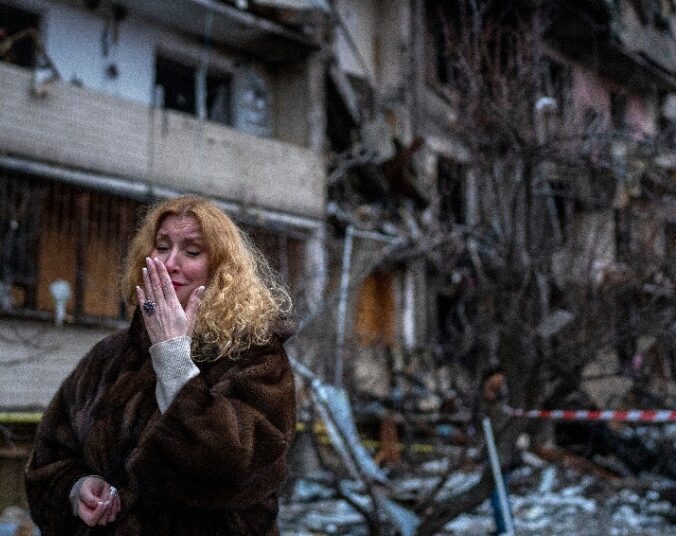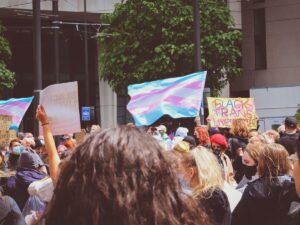By Anna Scott and Carla Mendonça
A new International Women’s Day, another war. As the conflict continues in Ukraine, the world watches, protests and reacts intently. An estimated one million and seven hundred thousand Ukrainian civilians have already migrated by this 8 March. They join millions of survivors and refugees who have been displaced by other armed conflicts around the globe. They are not guilty, they are condemned by war.
Since these Russian attacks started, women and children who have left their homes account for nearly two-thirds of the displaced population, according to United Nations (UN) estimates.
“We had to leave behind everything, our whole life’s work. It is a terrible feeling”, Marika Sipos told Daily Mail. She fled Koson, a village in western Ukraine, to Lonya, Hungary.
Women make up twenty-two million five-hundred thousand of the forty-three million people living in Ukraine. This includes the people residing in the Autonomous Republic of Crimea and Sevastopol which was annexed by Russia in 2014.
Women have left their partners behind to make the journey alone, sometimes, even separating from their children. This puts women and children in situations of extreme precarity. Relying on humanitarian assistance, support of NGOs and volunteer donations, women and children are left vulnerable.

War crimes
“History has repeatedly shown that the outbreak of conflict and war increases the exposure of women and girls to war crimes, especially all forms of gender-based violence, arbitrary killings, rape and trafficking,” the UN Human Rights states.
This risk will almost certainly exacerbate existing problems for women. Indeed, the UN Population Fund published findings on gender-based violence in Ukraine. They found that 75% of women in the country had reported experiencing some form of violence since age fifteen and one woman in every three had suffered from physical or sexual violence.
Health deprivation
Besides these atrocities, women in Ukraine face other specific challenges as a result of the conflict. These include family separation, psychosocial stress and trauma, physical harm and injury, and lack of access to sexual and reproductive health, warns the UN Women.
The UN Population Fund estimates that eighty thousand women residing in Ukraine at the beginning of the war will give birth in the next three months. Even in these first weeks of the war, news has come from Kyiv to report that babies have been delivered in bomb shelters. In these circumstances, the risks for mothers and newborns greatly increased.

In an interview with The Guardian, Viktoria tells in detail her experience of giving birth to Fedor in a bomb shelter on the second day of the war. “I hope my son will experience this war only from stories – that he will never, never feel what it’s like in real life. I don’t want him to know real war,” she wishes.
Dr Galyna Maistruk is a doctor specialising in obstetrics and gynaecology currently based in Western Ukraine. She told The Independent that the conflict is proving highly dangerous for women’s health. “Every story is unfortunately dramatic”, Dr Maistruk said.
Dr Maistruk is also a women’s rights activist and executive director for Women’s Health and Family Planning.

Excluded from negotiations
Ukrainian women have been at the forefront of the humanitarian response. They look after people and advocate for the restoration of collective human rights and fundamental freedoms.
Regrettably, they have been excluded from the negotiation tables themselves.
For UN Women executive director, Sima Bahous, women’s full and meaningful participation is vital to improving peace and security processes. “The inclusion of women themselves in the decision-making processes and humanitarian response is therefore essential to ensure that their rights are upheld,” she stated recently.
Women in Army
With mandatory conscription for all Ukrainian men aged 18-25, the military has long been, as in most countries, a male arena.
However, life had changed for Ukrainian women prior to the Russian invasion. In December 2021, women in certain professions were required to register as reserves in response to the mounting Russian military presence on Ukraine’s border.
Nevertheless, on 24 February, President Volodymyr Zelensky forbade men aged 18-60 from leaving Ukraine. Outnumbered by Russian troops and without personnel support from NATO countries, Zelensky called on male civilians to defend their country, leaving women free to seek refuge abroad.
While it is predominantly men preparing for combat, some women are also remaining to fight. One such woman is a member of the Parliament, Kira Rudyk, who has decided to take up a gun.
“After you spend two days in a bomb shelter, listen eight times in these two days to sirens warning about airforce attacks, seeing your family hiding under the stairs, you just have to do something”, Kira spoke to Chanel 4.
She also participates in the Resistance Force, where she was given a gun and training. She had never touched one before. “I do not want to flee, I do not plan to evacuate, but I think we all should do what we have to do, that is to fight Russian soldiers, someone who wants to take our land”, she comments.

Gender roles remain
Traditional gender roles dictate that it is women and children who must seek refuge. UN figures show that many Ukrainian women and children have fled to bordering countries such as Poland, Moldova, and Romania.
Since the large-scale Russian invasion of the country began on 24th February, the coverage has been extensive and grounded. Yet for every event documented, there are countless others that remain private, recalled solely in the minds of the beholders. Many of these stories belong to the women of Ukraine.
Only they know the truth of their experiences; only they can share the realities of displacement, or of loss. Yet even for outsiders looking in through their touch-screened windows, it is clear that the impacts are not the same for all. The cost of war is felt differently depending upon your gender.
This year’s International Women’s Day should be marked by solidarity and compassion. Let’s spend this 8th watching, supporting, and shouting for all women and girls victimised by male wars, both in Ukraine and around the globe.
You can help
- Donate to Choose Love’s Ukraine Fundraiser: https://donate.chooselove.org/campaigns/ukraine-appeal/
- Use Air BnB to either house a person fleeing Ukraine or to donate to Ukrainian Airbnb hosts, directly to those in need: https://www.airbnb.org/help-ukraine
- Support Ukrainian Women’s Fund: https://uwf.org.ua/en/
- Learn more about Ukraine: https://www.britannica.com/place/Ukraine















